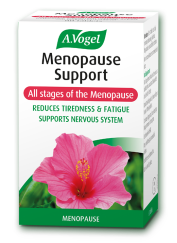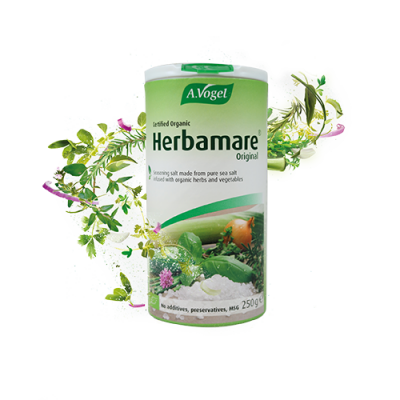Read the full video transcript below
Today's topic
Hello, and welcome to my weekly video blog. And today on A.Vogel Talks Menopause, I’m going to talk about some more of the less common symptoms of the menopause, although we’re finding that they are more common than what we first thought.
No. 1 – Cold flushes
Now, the first one is cold flushes. And we do find that a small number of women will get cold flushes or cold sweats instead of hot flushes and hot sweats. Now, this is caused by exactly the same mechanism as the hot flushes and night sweats.
Now, there’s a little gland in the brain called the hypothalamus and it does an awful lot of different things. But one of the things that it actually oversees is regulating our body’s temperature. And when our hormones start to fall, this temperature regulation can go a bit wonky. It’s a bit like our gas thermostat not actually working properly and your boiler ends up firing at all the wrong times. So you either get really hot or you get really, really cold.
So, in this instance, we normally recommend sage for hot flushes and night sweats, and sage should still work well for the cold flushes and the cold sweats too. Now, some women will get a combination of hot flushes and then they get really cold afterwards. This is quite common and it’s quite logical because if you start to sweat a lot, the body is basically sweating because your temperature regulation has gone offline and the body thinks it’s very, very hot. So it sends a rush of blood to the surface, makes you sweat. And as that sweat evaporates, it starts to cool you down.
And a lot of women find this happens especially at night. You will get the hot sweats in bed. And because the temperature in the room is normally a lot lower during the night than it is during the day, as the sweat starts to evaporate, you can chill down really quite rapidly. Again, sage should actually help with these, so it’s definitely worth trying. Now, the one thing I will say here is that if you feel cold all the time or if you feel that no matter what you do, if you’re sitting in front of the fire, if you’re putting on extra jumpers or extra clothes, if you feel that you never seem to get really warm, then that could be an indication that your thyroid is a little bit off.
And in that case, if you’re getting this particular symptom, it’s a good idea to go to the doctor and just ask the doctor to check your thyroid function. One of the things we have found in the menopause is that your thyroid functioning slowing down is actually really very common at this particular time. So it’s worth getting it checked at some point anyway, just so that you can rule it out with any other symptoms that you may be getting.
No. 2 – Leg cramps or restless legs
Now, symptom number two is leg cramps or restless leg. These tend to happen at night. You might be lying in bed just trying to get off to sleep and suddenly your legs are jumping all over the place or they suddenly go into a real spasm. This is very often caused by low magnesium. And for those of you that have been watching for a while, we know how important magnesium is in the menopause and the fact that most of us are low in magnesium. So if you’re getting the restless legs and the cramping, the first thing to do is just try some extra magnesium.
You can go with a magnesium citrate capsule. You can now get magnesium skin spray, so you can actually spray it onto your legs just before you get into bed. And there’s also a really lovely tissue salt remedy called Mag Phos. It’s like little tablets that you just put under the tongue and they dissolve. And these will very often work nearly on the spot helping with these particular symptoms. So it’s a nice one to have handy by the bedside just in case this happens.
No. 3 – High cholesterol
Now, symptom number three is raised cholesterol. Now, this is a difficult one because there can be a huge number of factors as to why your cholesterol has started to rise. We do know that as you get older, your cholesterol levels can rise with age. It can be due to diet. It can be due to stress. It can be due to hereditary factors. But what we’re actually finding is there does seem to be a link between starting the menopause and cholesterol levels rising.
And it’s quite interesting because when our hormones start to fall, the body goes into a bit of a panic. It wants to keep that level of hormones to keep everything balanced. And if it can’t get hormones by the normal route, it will start looking at other ways that it can grab on to oestrogen or manufacture oestrogen in the body. And cholesterol is actually a building block for your hormones. So the body will very often raise the cholesterol as your hormones start to change in order to maintain a nice supply of the hormones for the next couple of years.
So you need to watch out about this. What we find too is that a lot of women who are starting the menopause, they get a checkup from the doctor. They find that their cholesterol levels have increased. The doctor then puts them on medications such as statins which will reduce the level of cholesterol. If your body is producing cholesterol to help with the hormones, then by reducing cholesterol you may find that your hormone symptoms actually get worse.
Now, the one thing here really important, don’t, please don’t stop your medication. If you think that this may be an issue with you that cholesterol is to do more with the hormones, then please go and speak to your doctor about it, but we don’t want anybody just to suddenly stop taking their medications, really very important.
No.4 – Spots or acne
Symptom number four is spots or acne. And it’s amazing how many women come to us and say, “I haven’t had spots like this since I was a teenager. What on earth is going on?” This is definitely, you know, the hormonal changes. Very often it can be more to do with testosterone. Now, as a women, we do have a little bit of testosterone. And sometimes, if our oestrogen and progesterone have started to dip quite quickly, the testosterone levels can stay a bit higher and this can be a bit of a trigger for your acne and your spots.
But remember too that during the menopause, our livers can get really stressed and a stressed liver will very often cause problems with the skin and spots. Constipation can do it too. So if you’re getting spots that you’ve not had for a long, long time or you’ve gotten it for the first time ever, then have a look at your general lifestyle. Is your liver okay? Are you getting a bit constipated? Dehydration too can be another issue. So remember to drink lots and lots of water.
No. 5 – Re-appearing health issues
Now, the other symptom that we’ve noticed which sometimes comes with the spots and the acne is that, interestingly, some health issues that you may have had a long, long time ago or even an accident or even an injury can suddenly reappear in the menopause. And we have sort of looked into this there a little bit. It’s quite a fascinating subject. And we found that the body actually has a memory of things that happened to it maybe years and years ago. Because of our falling hormones, that ability to keep these things under control loosens.
It’s a little bit of us becoming a bit more emotional. Our emotional control decreases in the menopause. But our own ability to suppress things in the body can also be loosened as well. And some people do find that, you know, maybe, as a teenager, they had an accident and they very badly twisted their knee. And all of a sudden, they get exactly the same pain again. So you would need to look at each of these injuries or physical symptoms that come up and actually treat them accordingly.
Get in touch with your symptoms
So I hope you found these symptoms really interesting. We’re finding that so many women are getting symptoms that we’re not really aware of that is actually being caused in the menopause. So if you have anything that you’re not quite sure about, whether you think it’s a menopause symptom or not, then please do get in touch and we’ll try and figure it out for you. So I hope you’ve enjoyed this.
So, I will look forward to seeing you next week on A.Vogel Talks Menopause.

Are you Menopausal? Need help with your symptoms? Try our Menopause Symptom Checker.
Answer 3 question to find out if you could be menopausal and get personalised tips and advice straight to your inbox based on your results.










